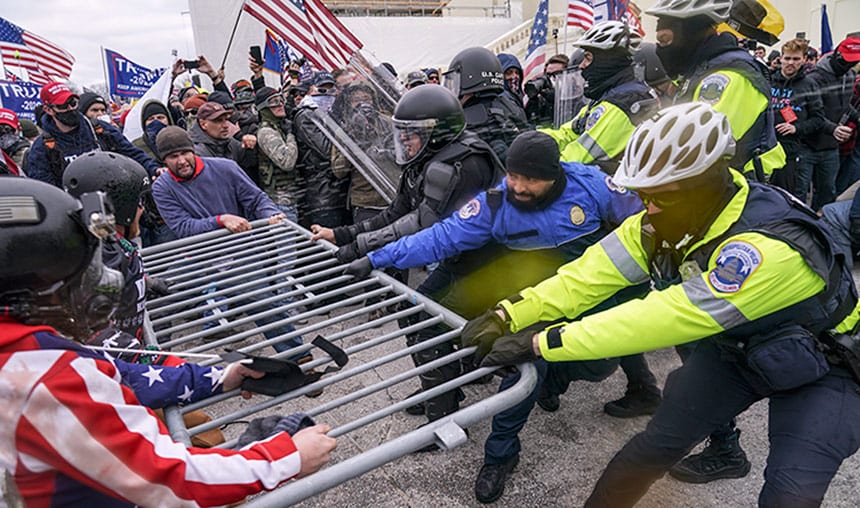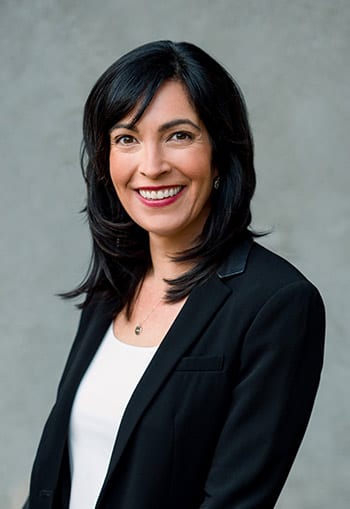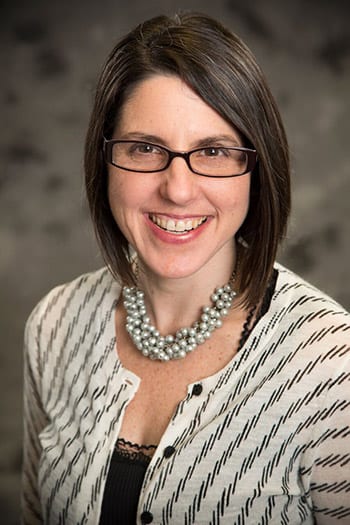
By Andrew Cohen
Throughout her career, Joanna Lydgate ’10 has always responded more to inspiration than convention. She spent four years working in nonprofit legal services before going to law school. Had her kids while clerking for a federal judge. Left a dream job as chief deputy in the Massachusetts Attorney General’s Office to launch a nonprofit during a global pandemic.
For Lydgate, the growing internal threats to American democracy sparked a call to action last year. Recalling past mentors at Berkeley Law “who encouraged me to take risks, think creatively, and understand the power of the law to effect change,” she poured herself into launching the Voter Protection Program — which has since evolved into the States United Democracy Center.
The nonpartisan organization works to advance free, fair, and secure elections by connecting state officials, law enforcement leaders, and pro-democracy partners across America with tools and expertise to safeguard democracy. As co-founder and CEO, Lydgate formed States United alongside two other veteran public servants: former U.S. Ambassador to the Czech Republic and Obama White House “Ethics Czar” Norman Eisen and former New Jersey Governor Christine Todd Whitman.

States United’s bipartisan advisory board features former governors, state attorneys general, secretaries of state, law enforcement leaders, and officials who served in both Democratic and Republican administrations. It includes Berkeley Law grad and former Alaska Attorney General Jahna Lindemuth ’95 and recent UC President Janet Napolitano, a former Secretary of Homeland Security who also served as Arizona’s governor and attorney general.
One of Lydgate’s first hires was Berkeley Law grad Jenn Fogel-Bublick ’98, former counsel at the U.S. Senate Committee on Banking, Housing and Urban Affairs and deputy executive director for the Democratic Attorneys General Association. As COO, Fogel-Bublick helps guide the programmatic work at States United.
Fogel-Bublick says that since Election Day and the January 6 U.S. Capitol insurrection that was fueled by lies about the election, “democracy violators have doubled down.” States United, she adds, is “fighting against misinformation campaigns and voter suppression efforts in state houses across the country.”
Leading up to the Electoral College certification, the organization published a definitive report rebutting claims that Vice President Mike Pence could overturn the election results and sharing guidance on how to prepare for and manage potentially violent demonstrations.
Lydgate and Fogel-Bublick recently discussed the new enterprise, the fragility of U.S. democracy, and their strategic approach to protect it.
What propelled the launch of the States United Democracy Center?
Lydgate: We were driven by a belief that protecting our democracy is not a partisan issue, but an American responsibility. Our mission was simple but critical: to equip state officials with the tools they needed to defend our elections and our democracy.
As attacks on the ballot box mounted, we built a team of bipartisan leaders with decades of experience in election protection. By bringing together current and former governors, secretaries of state, attorneys general, and law enforcement leaders, we helped build a nonpartisan firewall against those trying to undermine our democracy.
Joanna, what motivated you to help lead this effort?
Lydgate: During my time as chief deputy in the Massachusetts Attorney General’s Office, I saw up close how much it meant to the people of Massachusetts — and the country — to have state leaders who really worked for them. I had spent my career litigating against some of the worst corporate actors in America. When the lies about the 2020 election started to pick up steam, I knew our state leaders would need backup.
Jenn, what prompted you to join the organization?
Fogel-Bublick: In my 20 years working on important policy issues in Washington, D.C., nothing has come close to feeling as critical as protecting our elections and democracy. Making the jump to help start States United was an easy one. I felt my experience and passion were well-suited to helping this small but ambitious organization get right to work protecting our democracy.
What does the organization identify as its top priorities?
Lydgate: The priorities are to engage, empower, and equip state officials with the tools they need to defend our democracy. The first step was forming a team of advisors who understood the challenges the states were facing. Working with former Ambassador Norman Eisen and Governor Christie Todd Whitman, we built a team of bipartisan leaders and law enforcement officials with decades of experience in democracy protection.
Fogel-Bublick: When I came on board, States United was asking the right questions: Where were the vulnerabilities? What legal, policy, and communications strategies would be most effective? What could states learn from each other, and what steps could they take to ensure Election Day was safe and fair in every corner of the country? Joanna, Norm, and Governor Whitman were determined to be more than a think tank. They wanted to be an action tank.
How did States United become a valued resource for state leaders so quickly?
Lydgate: It wasn’t easy. Launching a new organization is a huge undertaking, and we had to do it in the midst of both a global pandemic and a democracy crisis. We are lucky to have an incredible network of pro bono law firms, legal experts, crisis communicators, and dedicated staff who are committed to supporting the inspiring state leaders across this country who literally saved our democracy in 2020 and continue to do so today. There have been a lot of late nights and lost weekends over the last few months, and more screen time for my kids than I’d like to admit. But the work is the best combination of challenging, dynamic, and impactful.

Fogel-Bublick: We are working with some of the smartest lawyers, communicators, and voting rights experts in the country — and we are doing it together with incredible focus. The stakes are high, and the team continues to put in the work and hours with our state partners to make a difference.
What does the election protection and accountability work entail?
Lydgate: With a specific focus on the unique tools available to governors, state attorneys general, secretaries of state, and law enforcement officials, States United is working every day to combat disinformation, amplify bipartisan voices defending our democracy, and translate nuanced legal decisions and policy positions into straightforward messaging for the public.
In 2020, our democracy survived — but not without some painful wounds. If we want to heal those wounds and prevent them from getting worse, we need accountability. States United is working with our partners to hold democracy violators accountable through advocacy, investigations, and litigation.
What’s your strategic focus for preventing political violence?
Lydgate: One of our areas of focus is confronting the rise in violent extremism — in particular, the rise of white supremacy, which threatens not only communities of color but the foundations of democracy. We saw this leading up to the election when state leaders were threatened, and we saw it on January 6th as groups like the Proud Boys and the Oath Keepers plotted, planned, and stormed the U.S. Capitol. When any American is made to feel unsafe for participating in democracy, that’s a threat to democracy. From coalition-building to policy development to legal resources, States United is focused on providing law enforcement leaders with the tools they need to prevent events like January 6th.
Why is the organization’s political diversity important?
Lydgate: We know that on the core issues, including protecting the freedom to vote, the American people are with us, regardless of party. And you can see that in our bipartisan advisory board, which is a distinguished group of former state and federal officials from both parties who are committed to the integrity of our democracy and American elections.
Having a nonpartisan team of lawyers, policy experts, and communications professionals creates pathways for state leaders to support each other as they fight to protect the will of the people in the courtroom, state houses, and the public debate. The diverse skill set of our team enables us to provide messaging guidance, fact-checking, and legal analysis when necessary.
How did your time at Berkeley Law shape your commitment to public service?
Lydgate: Berkeley’s focus on social justice and hands-on work influenced our careers and the public interest lawyering we do today. At Berkeley, there’s real emphasis on how the law works in practice and how to use the law to effect change. The law school also attracts an incredible student body; we were surrounded by diversity of thought and experience. Our classmates were also civically minded, and that had a great influence in and out of the classroom.
The incredible professors helped me understand not just the big theories and principles, but how to use the law concretely as a tool for social change. My classmates are still among my closest friends, and their shared commitment to public interest lawyering helped make those late nights and study groups not just bearable but fun.
Fogel-Bublick: Berkeley was a place that really solidified my desire to work on issues in the public interest. My first year module was dubbed the “love module” and included a group of interesting, diverse, and committed peers who cared about making the world a better place through law. It isn’t often you’re surrounded by a group like that. My fellow students at Berkeley were pretty inspirational, and I’m lucky that I feel that now as we build States United. Everyone from Joanna as CEO to our core staff to our advisory board members, they’re all creative, hardworking, and dedicated to our democracy.
What are your goals for States United, and how will you evaluate its success?
Lydgate: Our goal is to ensure pro-democracy state and local leaders have the tools and resources they need to protect the vote, hold democracy violators accountable, and prevent political violence. To put it simply, our goal is to strengthen and protect our democracy and become a go-to resource for state leaders, the press, and partner organizations. Our ability to give pro-democracy state leaders the backup they need is a key measure of success.
Fogel-Bublick: To be honest, we hope one day we go out of business, so to speak, because our democracy will be so strong that our work is no longer needed. Unfortunately, just as there has been real progress made to protect and expand access to the ballot, there has also been an organized and well-funded effort to suppress the vote and damage our republic. And that’s why we’ll continue to equip pro-democracy leaders with the tools they need to protect the freedom to vote.